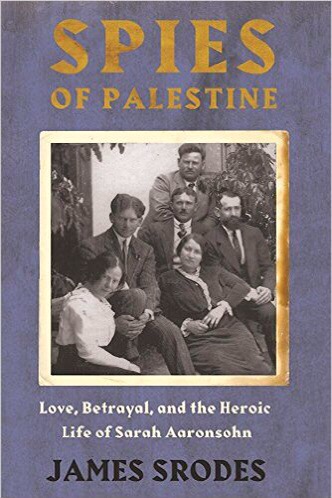
Spies in Palestine — James Srodes’ Account of Early Jewish Settlers Who Spied on Behalf of Britain During World War I
James Srodes’s Spies in Palestine — Love, Betrayal, and the Heroic Life of Sarah Aaronsohn is a concise account of a relatively obscure bit of Israeli history — the spying activities of Sarah Aaronsohn and her family during World War I. Sarah Aaronsohn stands out as a liberated woman from birth. Her confidence and initiative were strikingly uncommon for women of her era and made her an unusually placed and fascinating feminist hero. A very active horsewoman, Sarah roamed widely with little apparent regard for convention. The book recounts her relationships with various men in her life. Although it does not appear that she and T.E. Lawrence (Lawrence of Arabia) had an affair, Lawrence keeps wandering in and out of Sarah and her family’s milieu. In comparison to boisterous energy of Sarah and her family, Lawrence comes across as a bit of an ineffectual wimp, not at all like the strong, gorgeous hero portrayed by Peter O’Toole in the epic movie Lawrence of Arabia.
The Aaronsohns were Romanian Jews who settled in Palestine under the Ottoman Empire in the 1880’s. Sarah was born in Palestine and lived there most of her life, except for a short, unfortunate marriage that took her to Constantinople. Her family was based in Zichron Ya’akov and was relatively well known. Indeed, Sarah’s eldes brother Aaron developed an international reputation as an agricultural expert and used that to leverage international contacts and ultimately to begin spying on behalf of the British. The Aaronsohns’ spying effort were inspired by the Turks’ oppression of Palestine’s Jewish settlers during World War I. As it happens, the intelligence provided by the Aaronsohns through their spy ring was largely unsolicited by the British and sadly lacked discipline. In fact, it was almost comical how difficult Aaron and his family found it to help Britain. The Aaronsohns aggressively acquired information on Turkish positions in Palestine in order for the British to plan an effective invasion, but the British did not particularly trust the information and were not particularly interested. Even when the British decided to accept the Aaronsohns help they showed little concern for their safety and their military efforts were ineffectual.
Sarah become involved after she fled her marriage in Constantinople and returned to Palestine. On her way home she had observed first hand the Turks’ outrageous treatment of Armenians, and her entire family was appalled by the Turks’ treatment of Jews. Her brother Aaron had left Palestine to engage in efforts elsewhere, and so Sarah assumed leadership of the spy ring upon her return to Palestine. Although the information provided the Aaronosohns was good, the group’a execution was amateurish, particularly since the British mixed their lack of interest with a healthy dose of incompetence. They were easily betrayed, and tragedy ensued.
This is the story of successful espionage, but rather the story of an unbelieveably brave woman who voluntarily led a major effort to gather intelligence for Britain. Although it did not end well, Sarah’s heroic efforts deserve to be known and honored.
I liked this book for a lot of reasons. It was well-written and kept a good pace. More importantly, I learned about an early Jewish feminist who played a significant part in the early history of Israel. The historical backdrop of early twentieth century Palestine, Turkey and Britain, combined with the presence of the international Jewish community and a fantastic cast of characters made this a compelling read.